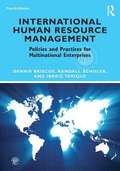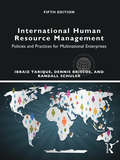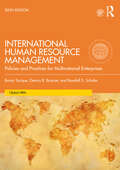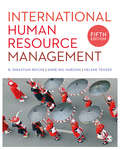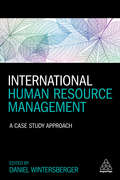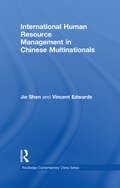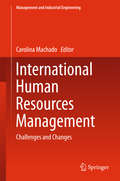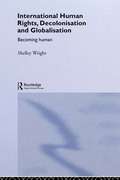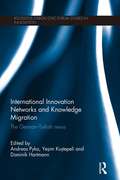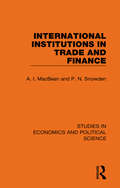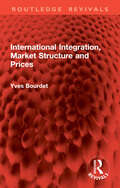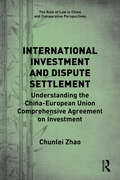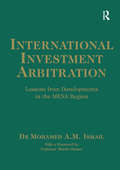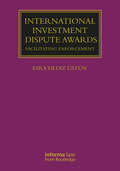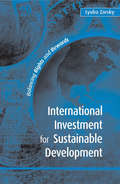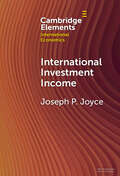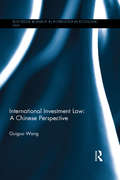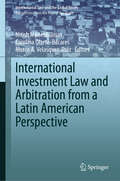- Table View
- List View
International Human Resource Management
by Mustafa F. Özbilgin Dimitria Groutsis William S. Harvey Mustafa F. Özbilgin Dimitria GroutsisInternational Human Resource Management offers a contemporary and multilayered introduction to international and comparative human resource management for university study. It critically analyses the core issues and emerging trends in the field, with a consistent emphasis on real-world scenarios and concerns. At the macro level, the book examines how IHRM fits within and adapts to the ever-changing environment of international relations and global development. At the firm level, it elucidates the strategic goals served by IHRM, and the processes used to achieve them. At the individual level, the analysis extends beyond the traditional focus on expatriates to encompass the various IHRM actors and their motivations. Each chapter features a case study, a media article, tutorial activities, discussion questions and links to further reading. The book concludes with three extended case studies, each based on a specific region, to help students consolidate their understanding.
International Human Resource Management
by Randall Schuler Ibraiz Tarique Dennis BriscoeThoroughly updated and expanded, the fourth edition of International Human Resource Management: Policies and Practices for Multinational Enterprises now includes learning objectives, discussion questions, end-of-chapter cases, and two end-of-book integrative cases. It has been designed to lead readers through all of the key topics in a highly engaging and approachable way. This book focuses on International Human Resource Management within multi-national enterprises (MNEs) and covers topics including: the development of IHRM MNE and country culture strategic IHRM organizational structure and design international joint ventures and cross-border mergers and acquisitions labor standards, ethics and codes of conduct global talent management selection and management of international assignees training and management development compensation and benefits health and safety and crisis management international HRIS international Human Resource Management departments and professionals. Uncovering precisely why International Human Resource Management is important for success in international business and how International Human Resource Management policies and practices function within the multinational enterprise, this comprehensive textbook provides an outstanding foundation for understanding the theory and practice of International Human Resource Management. This book is essential reading for all students, lecturers and International Human Resource Management professionals.
International Human Resource Management: Policies and Practices for Multinational Enterprises
by Ibraiz Tarique Dennis R. Briscoe Randall S SchulerThoroughly updated and expanded, the fifth edition of International Human Resource Management focuses on international human resource management (IHRM) within multinational enterprises (MNEs). The book has been designed to lead readers through all of the key topics of IHRM in a highly engaging and approachable way. In addition to the key topics and rich pedagogy students have come to expect, chapters have been updated, including an expanded chapter on Comparative and National Culture. Uncovering precisely why IHRM is important for success in international business, and how IHRM policies and practices function within the multinational enterprise, this comprehensive textbook provides an outstanding foundation for understanding the theory and practice of IHRM. It is essential reading for all students, instructors, and IHRM professionals. Instructor resources can be found at http://routledgetextbooks.com/textbooks/_author/globalhrm/
International Human Resource Management: Policies and Practices for Multinational Enterprises (Global HRM)
by Ibraiz Tarique Dennis R. Briscoe Randall S. SchulerThe updated sixth edition of International Human Resource Management is an authoritative resource that focuses on international human resource management (IHRM) within multinational enterprises (MNEs). The book includes fifteen chapters with rich pedagogy students have come to expect and is organized into four sections: Strategic Context National and Cultural Context Global Talent Management Role and the Future of IHRM Each chapter has been designed to lead readers through key topics in a highly engaging and approachable way with learning goals, relevant data, exhibits, figures, vignettes, end-of-chapter case studies, discussion questions, up-to-date content, and numerous references. The sixth edition includes discussions on evolving IHRM topics such as international experiences and adult third culture kids, expanded analyses on health and safety statistics and global workforce analytics, as well as updated and revised illustrations, cases, references, and instructor resources. Uncovering precisely why IHRM is essential for success in international business and how IHRM policies and practices function within the multinational enterprise, this comprehensive textbook provides an excellent foundation for understanding the theory and practice of IHRM. It is essential reading for all students, instructors, and IHRM professionals.
International Human Resource Management
by Dr Helene Tenzer Anne-Wil Harzing B. Sebastian ReicheUsed by over 25,000 students across 130 countries, this bestselling text, written by leading international experts in each topic, retains its critical edge, academic rigour and breadth of coverage in the new fifth edition. The new edition reflects the contemporary debates and emerging issues in the field of IHRM, supplementing classic theories and models with recent research and international developments. Divided into three parts, the first section looks at the ways of thinking about IHRM theory and practice; the second section deals with multinational companies and how they manage their workforce around the world; the final section looks at both traditional and newer approaches to IHRM policies and practices. A selection of up-to-date examples from across the globe are used to support the text, including Uber’s regulatory challenges across Europe, the gig economy, employment rights after Brexit, health insurance for part-timers in the US and EU, attracting and retaining ‘millennials’, the world’s happiest and unhappiest countries, and CSR in Hong Kong. The book is complemented by free online resources for lecturers and students, including PowerPoint slides, additional case studies, SAGE video clips with critical thinking questions, free SAGE journal articles for every chapter, annotated useful weblinks, and suggested answers to self-assessment questions. Suitable reading for upper-undergraduate and masters level students on IHRM modules.
International Human Resource Management
by Dr Helene Tenzer Anne-Wil Harzing B. Sebastian ReicheUsed by over 25,000 students across 130 countries, this bestselling text, written by leading international experts in each topic, retains its critical edge, academic rigour and breadth of coverage in the new fifth edition. The new edition reflects the contemporary debates and emerging issues in the field of IHRM, supplementing classic theories and models with recent research and international developments. Divided into three parts, the first section looks at the ways of thinking about IHRM theory and practice; the second section deals with multinational companies and how they manage their workforce around the world; the final section looks at both traditional and newer approaches to IHRM policies and practices. A selection of up-to-date examples from across the globe are used to support the text, including Uber’s regulatory challenges across Europe, the gig economy, employment rights after Brexit, health insurance for part-timers in the US and EU, attracting and retaining ‘millennials’, the world’s happiest and unhappiest countries, and CSR in Hong Kong. The book is complemented by free online resources for lecturers and students, including PowerPoint slides, additional case studies, SAGE video clips with critical thinking questions, free SAGE journal articles for every chapter, annotated useful weblinks, and suggested answers to self-assessment questions. Suitable reading for upper-undergraduate and masters level students on IHRM modules.
International Human Resource Management: A Case Study Approach
by Daniel WintersbergerIn the face of globalization, multinational companies have become the norm, rather than the exception. HR professionals now need to manage across borders, cultures and time zones, meaning that a complete understanding of the theory and practice of International Human Resource Management (HRM) is essential. International Human Resource Management is a concise introduction for all students studying International HRM at the Masters level. It covers everything from the cultural and institutional contexts, international employment law and the role of International Framework Agreements to recruitment and selection, training and development, performance management, reward and benefits, job design and other functional areas of International HRM.With numerous industry examples and global case studies from companies such as Telefonica, Unilever and Volkswagen, International Human Resource Management goes beyond the theory to fully explore how International HRM works in practice. It is an indispensable textbook to prepare students for successful careers in human resources. Online supporting resources include additional case studies, lecture slides for every chapter, self-test exercises for students, discussion questions and further reading.
International Human Resource Management in Chinese Multinationals (Routledge Contemporary China Series #Vol. 12)
by Jie Shen Vincent EdwardsThe authors explore the degree to which Chinese multinationals have a distinctive 'Chinese' approach to human resource management, in the same way as large Japanese companies are widely regarded as having a special Japanese approach. Based on extensive original research in the subsidiaries of Chinese multinationals outside China, the book examines a wide range of issues related to this key question including the evolution of human resource management in Chinese companies, the internationalization of Chinese business, recruitment and selection, rewards and compensation, performance appraisal, strategic integration, and employee relations. Shen and Edwards give a detailed account of the international human resource management of Chinese multinational enterprises; a topic of increasing significance in understanding global economic affairs.
International Human Resource Management in South Korean Multinational Enterprises
by Haiying Kang Jie ShenIn this book, Korean multinational enterprises management strategies in China are analyzed. China is re centering Asia around its newfound economic might, even as neighboring countries such as Japan and Korea will remain more economically developed for generations to come. How do Asian companies adapt to the Chinese market? In this fascinating study, Haiying Kang and Jie Shen investigate how Korean enterprises have adapted human resources practices to the evolving corporate climate in China. Unorthodox blends of culture, legal expectations, and more make the market a truly interesting one to explore HRM practices on the margins. Compelling for academics in HRM but also related social sciences, HR practitioners, and corporate leaders alike, this book is a timely look at new Asian corporate cultures.
International Human Resources Management
by Carolina MachadoThis book covers the issues related to human resource management (HRM) in an international context. It gives perspectives and future direction in International HRM research. The chapters explore the models, tools and processes used by international organizations in order to assist international managers to better face the challenges and changes in HRM. It is suitable to HR managers, engineers, entrepreneurs, practitioners, academics and researchers in the field.
International Human Rights, Decolonisation and Globalisation: Becoming Human (Routledge Studies in International Law)
by Shelley WrightCovering a diverse range of topics, case studies and theories, the author undertakes a critique of the principal assumptions on which the existing international human rights regime has been constructed. She argues that the decolonization of human rights, and the creation of a global community that is conducive to the well-being of all humans, will require a radical restructuring of our ways of thinking, researching and writing. In contributing to this restructuring she brings together feminist and indigenous approaches as well as postmodern and post-colonial scholarship, engaging directly with some of the prevailing orthodoxies, such as 'universality', 'the individual', 'self-determination', 'cultural relativism', 'globalization' and 'civil society'.
International Human Rights Law
by Olivier De SchutterThis volume offers a systematic overview of the different tools through which the human rights accountability of transnational corporations may be improved. It first examines the responsibility of States in controlling transnational corporations, emphasizing both the limits imposed by the protection of the rights of investors under investment treaties and the potential of the US Alien Tort Claims Act and other similar extra-territorial legislations. It then turns to self-regulation by transnational corporations, through the use of codes of conduct or international framework agreements. It then discusses recent attempts at the global level to improve the human rights accountability of corporations by the direct imposition on corporations of obligations under international law. Finally, it considers the use of public procurement policies or of conditionalities in the lending policies of multilateral lending institutions in order to incentivize TNCs to behave ethically. Altogether, the book offers a rigorous legal analysis of these different developments and critically appraises their potential.
International Innovation Networks and Knowledge Migration: The German–Turkish nexus (Routledge/Lisbon Civic Forum Studies in Innovation)
by Andreas Pyka Ye Dominik HartmannMigration is conceived differently in Europe compared with countries like the US, Canada or Australia. International Innovation Networks and Knowledge Migration confronts traditional views on migration with modern theories of brain circulation and innovation networks, showing that migration leads to mutual benefits for both the home and host countries This new volume brings together several case studies and empirical in-depth analyses which are constructed from the strong migration relationship between Turkey and Germany that has existed for more than 50 years. Bringing together over 20 international contributors, this book highlights that knowledge migration and cultural diversity can strongly stimulate entrepreneurial activities, competence acquisition and economic development of countries and regions. The authors highlight the considerable scope for improvement of European migration policies in order to be better prepared to successfully process structural changes stemming from an aging society in Europe, and an increasing international division of labour. This volume is suitable for those who study industrial economics, international economics and European economics. It is also of interest to those who want to delve deeper into the Turkish-German migration nexus.
International Institutions
by Louis T. Wells Jr. Lakshmi Gopalan David A. MossDescribes the IMF, the World Bank Group, the regional development banks, the Bank of International Settlements, the OECD, and the Group of 7.
International Institutions in Trade and Finance (Studies in Economics and Political Science)
by A. I. MacBean P. N. SnowdenOriginally published in 1981, this book provided an up-to-date and critical review of the recent history and current status of the main economic institutions affecting international trade and relations at the time. The authors emphasise the economic effectiveness or otherwise of such bodies as GATT, IMF, EEC, UNCTAD and the World Bank, but take account of the political factors present in both the initial ‘design’ and in the way that the institutions have developed. In particular, the book analyses the changed degree of dominance which the USA had been able to exert on the international community.
International Integration, Market Structure and Prices (Routledge Revivals)
by Yves BourdetOriginally published in 1988, this study focusses on international economic integration in relation to the passenger car industry and market in the West-European car-making countries, Germany, France, Italy, Sweden and the UK in the second half of the 20th Century when the revival of protectionism was a key feature of the international trading system. The book illustrates the interaction between international integration, market structure and firm conduct and the political sphere at the national as well as the supranational level. Unlike previous analyses of international integration, this book concentrates on a single industry over a significant period.
International Integration of the Brazilian Economy
by Elias C. GrivoyannisBrazil is the most populous economy in Latin America with the second highest GDP among the emerging BRIC economies, after China, and the second per capita GDP among the BRIC economies after Russia. The objective of this book is to provide a thorough historical, statistical, and institutional description of the factors that affect and are affected by Brazil’s international trade and integration with the world economy. It includes a most recent account of what is presently going on in Brazil and the type of economy from which Brazil is emerging. The authors use Brazil as a case study and explain both the process and the outcome of international economic integration by analyzing in each chapter a different contributing factor to the benefits and costs from Brazil’s economic interdependency with the world economy. This makes the reading of this book extremely valuable. The topics addressed in this book will increase the reader’s awareness of the institutional, economic, and cultural forces that shape the dynamism of Brazil’s international trade and integration with the world economy, and will continue to do so in future years.
International Investment and Dispute Settlement: Understanding the China–European Union Comprehensive Agreement on Investment (The Rule of Law in China and Comparative Perspectives)
by Chunlei ZhaoThis book analyzes the dispute settlement mechanisms under the EU-China Comprehensive Agreement on Investment (CAI), including the already established mechanisms for general state-to-state dispute settlement and the Mechanism to Address Differences for investment and sustainable development issues. When China and the EU, two of the biggest players in international investment, announced the completion of the China-European Union CAI negotiations, the dispute settlement system remained incomplete. While they reached an agreement on state-to-state dispute settlement, the controversial investor-state dispute settlement is subject to ongoing negotiations. This book explores the possible procedural design of investor-state dispute settlement mechanisms under the EU-China CAI, including potential proposals, issues, and solutions. In addition, this work analyzes the separation, connection, and combination of state-to-state and investor-state dispute settlement, all with a mind to ensuring the function and operation of diverse mechanisms and establishing a comprehensive system for successful investment dispute settlement. Focusing on the complete dispute settlement system under the EU-China CAI, this book will be a valuable resource for students, academics, and policymakers working in the areas of international dispute resolution, international investment law, international economic law, and comparative law.
International Investment Arbitration: Lessons from Developments in the MENA Region
by Mohamed A.M. IsmailArbitration is the most common mechanism for disputes' settlement in developing countries. Following the move to free market economies, arbitration will play an increasingly fundamental role in order to protect foreign investors in the Middle East and North African Region (MENA). This book examines the pulse and dynamics of international investment arbitration and the new era of mediation in state contracts in the region. The author explores the harmonization of international arbitration and the sensitive issue of le Contrat Administratif in Middle East civil law countries. The volume also discusses the pivotal role of international organizations such as UNCTAD and ICSID in codifying fair and prompt mechanisms for dispute settlement. Using Latin American countries as a prime example of how international legislative instruments serve international investment law principles and comparing Latin American experiences where appropriate, the book demonstrates how lessons can be learned in respect of alternative dispute resolution, international commercial arbitration and investor-states arbitration. It provides suggestions and recommendations for the future and includes useful appendices detailing recent worldwide trends, regional and international instruments in the arbitration world.
International Investment Dispute Awards: Facilitating Enforcement (Lloyd's Arbitration Law Library)
by Esra Yildiz ÜstünThis book examines how international investment arbitral awards can be facilitated. It sets out to achieve a fuller conceptualisation and theorisation of awards through a discussion of relevant issues and themes, as well as demonstrating how they can be achieved through a comparative approach that has been conceived and developed with reference to existing deficiencies in the research literature. This contribution is particularly important given the worldwide emergence of investment arbitration as a powerful form of alternative dispute resolution (ADR). The book ultimately seeks to explore and develop solutions that can be directed to an existing oversight and deficit within the international investment architecture. In considering the advantages and disadvantages of each ‘solution’, it will work towards an approach best-suited to upholding the interest of the victorious party at the enforcement stage. The enforcement of arbitral awards on a voluntary basis has proven to be insufficient, and this created a real and ongoing shortcoming that needs to be addressed. International Investment Dispute Awards: Facilitating Enforcement therefore seeks to directly influence existing practice on the part of international institutions, with the intention of helping to develop a more effective resolution. The readerships for this book will include arbitration practitioners, policy-makers (including treaty drafters), academics and postgraduate students interested in the enforcement of investment arbitral awards.
International Investment for Sustainable Development: Balancing Rights and Rewards
by Lyuba ZarskyInternational Investment for Sustainable Development critically examines the interface between sustainability, development, and the governance of international investment. It challenges the conventional view that foreign direct investment is a 'miracle drug' for developing countries and exposes serious shortcomings in the current international investment regime. Composed of norms, agreements, treaties and regulations, the emerging investment regime expands the rights of transnational corporations (TNCs) without commensurate rewards for the common good. Drawing on both research and engaged advocacy, the contributors ultimately map out a new way forward, towards the creation and implementation of international investment rules that will promote global sustainability and equity.
International Investment Income (Cambridge Elements in International Economics)
by Joseph P. JoyceInternational investments yield returns in the forms of multinational profits, dividends and interest on equity and debt, and the charges on bank loans. These payments are recorded in the current account of the balance of payments and constitute a significant component of many countries' current accounts. Foreign direct investment- (FDI)-generated income is often channeled by firms through countries with low tax rates and regulations. Emerging markets regularly have large FDI income deficits, but a substantial portion of these payments are reinvested. Portfolio securities provide income from diversified securities and lower risk. Global banking offers financing from foreign sources, which may support stability during periods of domestic crises.
International Investment Law: A Chinese Perspective (Routledge Research in International Economic Law)
by Guiguo WangIncreasing and intensified cross-border economic exchange such as trade and investment is an important feature of globalization. In the past, a distinction could be made between capital importing and exporting countries, or host and home countries for foreign direct investment (FDI). Due to globalization, FDI is presently made by and in both developed and developing countries. Differences in political, economic and legal systems and culture are no longer obstacles for FDI, and to varying degrees the economic development of almost all countries is closely linked with the inflow of FDI. This book conducts critical assessments of aspects of current international law on FDI, focusing on cases decided by the tribunals of the International Centre for Settlement of Investment Disputes (ICSID) and other tribunals as well as decisions of annulment ad hoc committees of the ICSID. In examining such cases, Guiguo Wang takes into account the Chinese culture and China’s practice in the related areas. The book explores topics including: the development and trend of international investment law; unilateral, bilateral and multilateral mechanisms for encouraging and protecting FDIs; determination of qualified investors and investments and consent as conditions for protection; relative and absolute standards of treatment; determination of expropriation in practice; assessment of compensation for expropriation; difficulties in enforcing investment arbitral awards; and alternatives for improving the existing system. The book will be of great use and interest to scholars, practitioners and students of international investment law and international economic law, Asian law, and Chinese studies.
International Investment Law and Arbitration from a Latin American Perspective (International Law and the Global South)
by Nitish Monebhurrun Carolina Olarte-Bácares Marco A. Velasquez-RuizThe book brings to light how Latin American states have traditionally stood before the field of International Investment Law and Arbitration. It delves into their posture of resistance to critically examine how their perspective has gradually changed and how they have adapted and molded their investment agreements so as not to leave their position as players in the field of International Investment Law. Many Latin American states have appeared as defendants before international investment tribunals and some of these, like Venezuela, Bolivia or Ecuador, have denounced their international investment agreements. Deeming the law field as imbalanced, they have looked for alternatives to continue providing legal protection to foreign investors while protecting their right to regulate in the name of public interest. Some interesting investment agreements models, sometimes of a different ilk, have consequently flourished and have arrested the attention of those studying or working with international investment law.The main objective of this book is to critically discuss how Latin American states have accepted, resisted, or adapted themselves to international investment law and arbitration. Accordingly, the general connection between these states and international investment law are explained in an introduction which examines the general trends as per which Latin American states have offered a legal protection to foreign investments. The first part enters the merits of where international investment law and arbitration stand in some Latin American states whereby the experience of Brazil, Chile, Argentina, Venezuela, and Uruguay are discussed. The following parts explain the trends in international investment law and arbitration in Latin America. These trends are namely related to dispute settlement and governance, to the connection between investment law and human rights and finally to regionalization. In these parts, the experience of states like Brazil,Colombia, Peru, and Mexico are perused.

